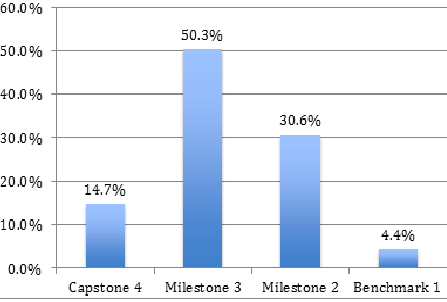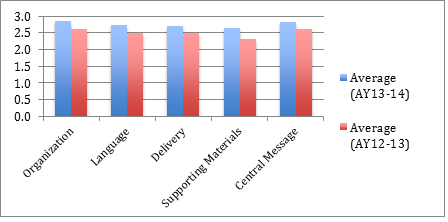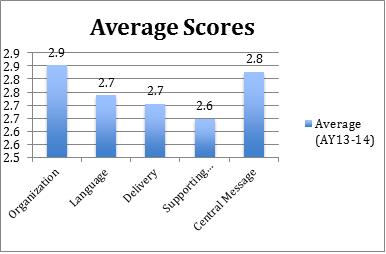- Our College
- Academics
- Student Services
- Public Reports
- Forum
- Library
- Quick Access
At the completion of the Institutional Student Learning Outcomes, the student will be able to:
ISLO Assessment Report Summary
Previous ISLO report can be viewed at this link:
http://www.comfsm.fm/?q=islo-2012-2014
wiki.comfsm.fm/Academic_Programs/Institutional_Level_Student_Learning_Outcomes
The college is currently undergoing a CSLO/ ISLO linkage process. This process will enable the college to identify which ISLOs will be assessed in which courses.
For Academic Year 2013-2014 the college assessed effective oral communication using the AAC&U Value Rubric. A total of 156 students were assessed from twelve selected courses from eight programs at the college. Each course identified an oral communication activity/ assignment and assessed the student’s performance using the value rubric. These activities/ assignments ranged from argumentative speeches, informative speeches, and PowerPoint presentations that were relevant to the course/program content.
Oral communication was assessed in the following programs/ courses:
| Program | Courses |
| Nursing | NU 225 Health and Illness II |
| Computer Information Systems | IS260 Business Information Systems |
| Public Health | PH 316B Research Project in Applied Epidemiology and Health Research |
| Liberal Arts | EN/CO205 Speech Communication (5 sections) |
| Pre-Teacher Preparation | ED292 Practicum and Seminar (2 sections) |
| Micronesian Studies | SS280 Directed Study: Selected Topics (2 sections) |
| Marine Science | MR254 Marine Biology Field Studies |
| Business Administration | EN121 Business Communication |
Based on the resuts, 95.6% of students were able to prepare and present a purposful presentation that was able to increse knowledge, foster understanding or to promote change in the listeners' attitudes, values, beliefs, or behaviors as rated by the rubric.
Criteria for success for the students at the College of Micronesia-FSM is set at the milestone level of two to three. The reason for this is that the AAC&U VALUE Rubrics were designed for four-year institutions, so a rating of four would be more appropriate for a students graduating from a four-year institution.
The following chart displays the percentage of students who were succesful at each level.

Comparative results between Academic Year 2013-2014 and Academic Year 2012-2013

There was a slight increase in student success from AY 12-13 to AY 13-14.
Criteria for success for the students at the College of Micronesia-FSM is set at the milestone level of two to three. The reason for this is that the AAC&U VALUE Rubrics were designed for four-year institutions, so a rating of four would be more appropriate for a students graduating from a four-year institution.
The bar chart below indicates the average rating for each criterion. It is noted that the overall rating is between 2.6 to 2.9. This rating reaches the minimum criteria for success at the College of Micronesia-FSM. The two highest scoring categories are central message and organization. This indicates that student are able to maintain a central message to their oral presentation and that the presentation are well organized. The use of supporting materials scored the lowest, which may be linked to a weakness in critical thinking skills and research skills. Critical thinking skills will be formally assessed in the Fall 2014

For Academic Year 2014-2015 a full matrix will be completed to ensure a comprehensive ISLO assessment plan.
The following table shows which ISLOs will be assessed for Academic Year 2014-2015.
| Fall 2014 | Spring 2015 |
| Effective oral communication | Intercultural knowledge and competence |
| Effective written communication | Information literacy |
| Critical thinking | Foundations and skills for life-long learning |
| Problem solving | Quantitative reasoning |
This website and all COM-FSM Internet based services are best viewed with Firefox 3.0 or better.
© Copyright 2020 College of Micronesia-FSM | Site Disclaimer
P. O. Box 159, Kolonia, Pohnpei, 96941 - (691) 320-2480
College of Micronesia-FSM is accredited by the Accrediting Commission for Community and Junior Colleges,
Western Association of Schools and Colleges, 428 J Street., Suite 400 Sacramento, CA 95814, (415) 506-0234,
an institutional accrediting body recognized by the Council for Higher Education Accreditation and the U.S. Department of Education.
Additional information about accreditation, including the filing of complaints against member institutions, can be found at: www.accjc.org